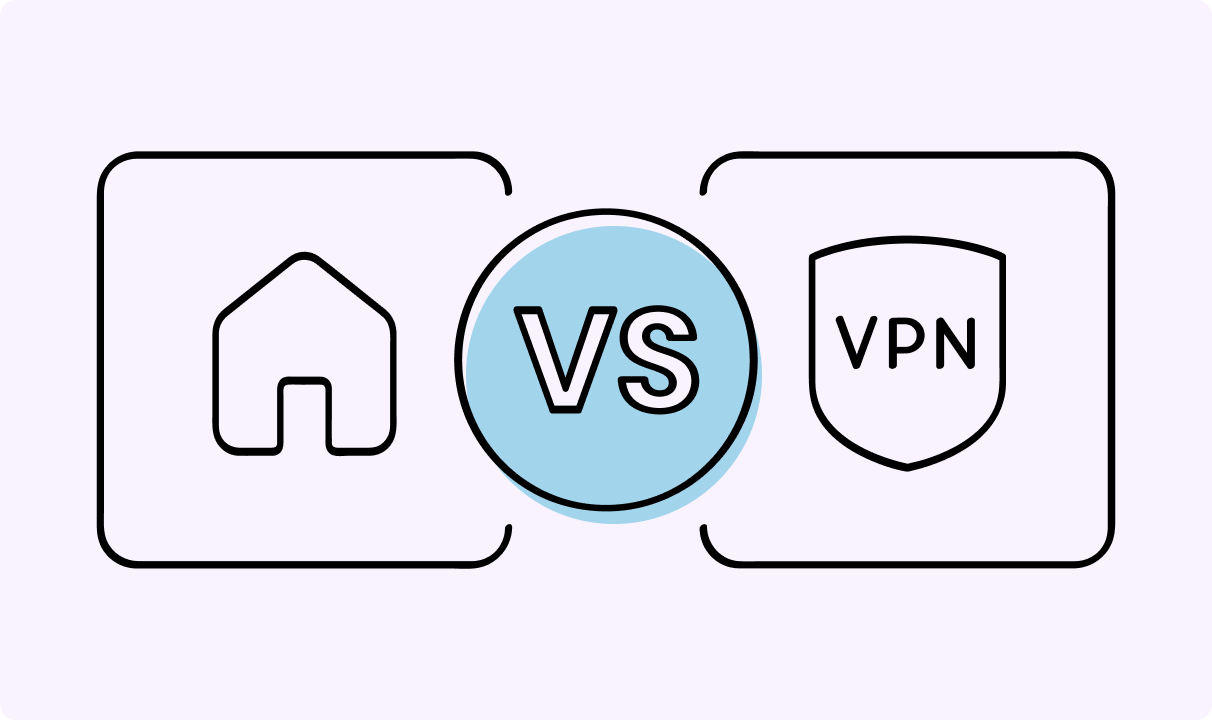Residential Proxy vs VPN: Which Is Right for You?
Key takeaways:
- A residential proxy provides a householdIP address to conceal your identity, whereas residential VPN does the same but it adds an additional layer of encryption to all your traffic.
- Residential proxy can be configured to adjust its applicability and also provide better speed, but VPN is easier to use and ensures a higher level of security.
- Residential VPN is easier to use, therefore, it is better for privacy, streaming, and public Wi-Fi protection, while residential proxy fits best for automation, scraping, and geo-targeting.
Choosing between a residential proxy and a VPN might seem like a headache. But it doesn’t have to be. Knowing their key differences and use cases will bring out the optimal choice for your needs.
Although both residential proxies and VPNs help to hide your IP address which results in the ability to bypass restrictions, such as unblocking your IP or accessing geo-restricted content, they are meant to achieve slightly different goals.
Aligning your needs with those goals is what will help you make your pick.

Rasa Sosnovskytė
4 min read

What is a residential proxy?
A residential proxy is an intermediary server that routes your online traffic through a device with a residential user’s household device’s IP address assigned by an Internet Service Provider (ISP). This makes your requests appear as if they are coming from a device located in a house other than your own.
The key feature that sets a residential proxy apart from its competitors, is that it has massive pools of residential IP addresses that can be rotated automatically per request.
It means that each time you send a request, the website will see it coming from a different IP and assume it to be a different user. Such juggling with different IPs from residential proxies allows you to mask your identity completely.
These capabilities make residential proxies ideal for web scraping, ad verification, and social media management. Let's see how it compares to what a residential VPN is.
What is a residential VPN?
A residential VPN (Virtual Private Network) works similarly in terms of IP masking but goes further by encrypting all your internet traffic (more than the regular HTTPS encryption provided by communication protocols).
Instead of just routing your requests, a residential VPN encrypts the entire device’s connection and then routes it through a residential IP address residential VPN.
It gives a secure, encrypted tunnel that makes it nearly impossible for third parties to intercept or read your data. Even if you don’t use a dedicated VPN IP and share it with other users, you can still bet on being safeguarded from cyber threats.
It has all the benefits that a residential IP address has, but a product from a good VPN provider adds an extra layer of security, maybe the most important one in some, namely, additional level of your traffic encryption.
Encryption & Privacy
One of the biggest key differences between residential proxies and residential VPNs lies in how they handle privacy.
- VPNs encrypt all your online traffic. Everything from your browser to your email client is protected. With residential IP addresses, a VPN’s provided security ensures both full encryption and complete legitimacy in the eyes of a web server.
- Proxies don’t encrypt. They simply act as an intermediary server that masks your user’s real IP. You are secured in terms of identity concealment, but those requests, even though sent from different IPs, still carry identifiable information that’s visible to the proxy server itself.
If your primary concern is privacy, VPNs (especially residential VPNs) are the clear winner here.
Performance & Speed
When it comes to speed, residential proxies generally perform better:
- Residential proxies are ideal for automation and scraping because they are a bit faster and can be integrated with other tools and scripts.
- Residential VPNs, on the other hand, can impact real-time tasks, which alters the main goals that it best suits to fulfill, because VPNs are a bit slower and less adaptable to other software, compared with residential proxies.
So if you need speed to scrape the web on the grand scale, residential proxy has the edge. However, other use cases can be fully covered by VPNs. If you want total encryption, VPN is indispensable for tasks requiring a high level of security, especially regarding sensitive data, communication channels, or internal resource protection.
Scope of Application
Residential proxies and VPNs can both be applied to all your systems, however, they differ in their capability to narrow down their scope:
- VPN applies system-wide. A VPN applies to all your internet traffic system-wide. Once connected, all your apps and browser activity are protected. Some VPNs, however, provide a Split Tunneling feature, which lets you slightly modify this behavior.
- Proxies can be set per application. A residential proxy server can be configured per application or browser. This gives you granular control, which is especially useful in web scraping or bot-driven workflows.
This key difference affects usability and control, making proxies more modular while VPNs are more holistic.
Use Case Suitability
Depending on what you are trying to do, the ideal solution varies, and the choice between residential VPN and residential proxy server might alter accordingly:
Residential VPN:
- Great for private, secure browsing.
- Ideal for streaming geo-restricted content.
- Excellent when using public Wi-Fi.
- Focused on everyday users.
Residential proxy:
- Best for web scraping and data automation.
- Useful for running multiple accounts.
- Great for accessing geo-restricted content while avoiding detection.
- Focused on business applications.
For clearer view, mind the differences on these key facets of residential proxy and residential VPN in this table:
Feature | Residential Proxy | Residential VPN |
|---|---|---|
| IP source | ISP-issued home IPs | ISP-issued home IPs |
| Encryption | No | Yes |
| Scope | Per application/tool | System-wide |
| Speed | Faster, lower latency | Slower |
| Use cases | Automation, scraping, geo-targeting | Privacy, streaming, public Wi-Fi protection |
| Detection risk | Lower (rotating IPs) | Medium (depends on VPN configuration) |
Choose Residential Proxy If:
- You need rotating IPs for web scraping or automation
- You manage multiple accounts on social or ecommerce platforms
- You want to access geo-restricted content without being flagged
- You need higher speed while staying anonymous
Choose Residential VPN If:
- You want to encrypt data across your whole device
- You frequently use public Wi-Fi or travel
- You prefer a plug-and-play setup with fewer manual configurations
- You want access to geo-restricted content for streaming
Final Verdict
The ultimate decision between a residential proxy and VPN depends on whether you need to scrape the web at scale with a higher speed or you need multiple IPs constantly rotating, or if your primary concern is complete privacy rather than mere concealment of the original IP address.
If the latter is the case, buy residential IP VPN. Otherwise, a residential proxy might do the trick and leave your needs satisfied.
Frequently Asked Questions
Are VPNs safer than residential proxies?
Yes, VPN encrypts all your data, offering stronger privacy. A residential proxy hides your IP but doesn't secure your traffic as much, even though they are a reliable choice too.
Which is better for web scraping – VPN or residential proxy?
A residential proxy is better suited for web scraping thanks to its rotating IPs, app-level control, and lower latency.
Can a VPN be detected more easily than a residential proxy?
Yes. Some sites can identify and block VPNs, even residential VPNs. A rotating residential proxy server is harder to detect.

Author
Rasa Sosnovskytė
Chief Executive Officer at Growth Bite
Rasa is a well-known SEO expert and co-founder of Growth Bite, a digital marketing agency. She has previously worked with globally recognized brands such as NordVPN, Oxylabs, and many others.
Related articles
4 min read
Ethernet vs Wi-Fi: Which One is Better?
Ethernet and Wi-Fi are the two main ways to connect your computer to the internet. While Wi-Fi has received significantly more attention in recent years, especially among consumers, due to its simplicity and flexibility, ethernet is still widely used in various other applications.
Even if Wi-Fi is significantly more popular, it isn’t strictly better. Both methods have their benefits and drawbacks. Wi-Fi’s popularity comes from its ease-of-use and flexibility, but an ethernet connection can be much more useful in certain scenarios.

Adomas Šulcas

5 min read
How to Change Chrome Proxy Settings: The Ultimate Guide
A proxy server is an easy alternative to a VPN that can perform most of the functions of the latter. It’s a server that stands between your device and the destination server, taking your connection requests and forwarding them in your name.
Destination servers in almost all cases see the proxy server as the originator of the request. As such, proxies are widely used in various, mostly business-related applications whenever privacy, security, location changing, and several other factors are at play.

Guoda Šulcaitė